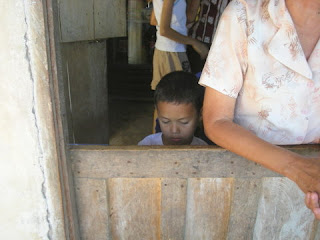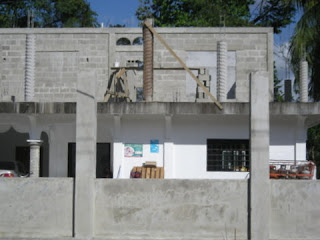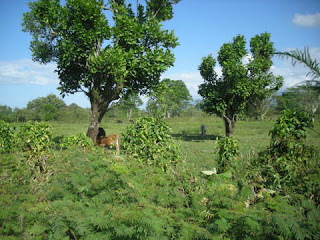 Elsa Gloria Ventura of Tripoli, Honduras
Elsa Gloria Ventura of Tripoli, Honduras As we drove through Tripoli, we asked Don Pedro (previous article) if he would like to stop for a refreshment, so we stopped at Doña Elsa's pulpería, which had a couple of small tables in the shade of the covered porch. We ordered orange drinks and tajaditas con limón (thinly sliced, fried plantain slices with lemon flavoring), my favorite of the Honduran packaged junk food.
As we drove through Tripoli, we asked Don Pedro (previous article) if he would like to stop for a refreshment, so we stopped at Doña Elsa's pulpería, which had a couple of small tables in the shade of the covered porch. We ordered orange drinks and tajaditas con limón (thinly sliced, fried plantain slices with lemon flavoring), my favorite of the Honduran packaged junk food. Elsa Gloria Ventura is not from Tripoli either! She replied to our question by saying she was from San Antonio la Guaruma in the departamento of Valle in the south of the country. She then went on to say that she has lived in Tripoli for 36 years. Her husband had found work here and after awhile returned to bring her and the children here to live when she was 34 years old.
Elsa Gloria Ventura is not from Tripoli either! She replied to our question by saying she was from San Antonio la Guaruma in the departamento of Valle in the south of the country. She then went on to say that she has lived in Tripoli for 36 years. Her husband had found work here and after awhile returned to bring her and the children here to live when she was 34 years old. Doña Elsa has two sons in Virginia in the US, and a daughter living in San Pedro Sula. She said that her sons were having a hard time finding work in the US and making enough to send money back to the family in Honduras. She may have other children who still live in Tripoli, too, as several young ones who appeared to be her grandchildren were wandering in and out of the back of the store.
Doña Elsa has two sons in Virginia in the US, and a daughter living in San Pedro Sula. She said that her sons were having a hard time finding work in the US and making enough to send money back to the family in Honduras. She may have other children who still live in Tripoli, too, as several young ones who appeared to be her grandchildren were wandering in and out of the back of the store. This photo shows the only construction that I noticed in Tripoli, the addition of a second floor. This was almost odd, as we frequently see partly completed construction in almost every little town that we go to. Often this is a result of money sent to families from relatives in the extranjera. The houses are completed in cycles, as the cash is available, the walls one year, the roof the next, and so on.
This photo shows the only construction that I noticed in Tripoli, the addition of a second floor. This was almost odd, as we frequently see partly completed construction in almost every little town that we go to. Often this is a result of money sent to families from relatives in the extranjera. The houses are completed in cycles, as the cash is available, the walls one year, the roof the next, and so on. Doña Elsa was curious about us (especially since I was taking notes), where we lived, where we met, and why we were there. El Jefe tried to explain that I was a writer and was going to write about Tripoli on the internet. That was met with furled brows and expressions that said, "Internet? .... whatever." "She writes a blog so that others can know Honduras." That was met with perplexed expressions that said, "Blog? .... whatever."
Doña Elsa was curious about us (especially since I was taking notes), where we lived, where we met, and why we were there. El Jefe tried to explain that I was a writer and was going to write about Tripoli on the internet. That was met with furled brows and expressions that said, "Internet? .... whatever." "She writes a blog so that others can know Honduras." That was met with perplexed expressions that said, "Blog? .... whatever." She was the first to bring up the old politics of Carías (for whom she still harbors hard feelings) and Suázo Cordova (who she still remembers fondly). When asked about the current government, she complained about the road not being graded in more than a year, but just shrugged about anything else. She asked us what we thought about Zelaya's ouster. We try to avoid discussing our politics in order to hear more about theirs so El Jefe changed the subject.
She was the first to bring up the old politics of Carías (for whom she still harbors hard feelings) and Suázo Cordova (who she still remembers fondly). When asked about the current government, she complained about the road not being graded in more than a year, but just shrugged about anything else. She asked us what we thought about Zelaya's ouster. We try to avoid discussing our politics in order to hear more about theirs so El Jefe changed the subject. But Elsa insisted and asked me directly, "And you? Golpe de estado o no?". So I told her that I didn't think that it was a coup. Doña Elsa was surprised. "How can you say that?! He was there one day and gone the next! It was a golpe!"
But Elsa insisted and asked me directly, "And you? Golpe de estado o no?". So I told her that I didn't think that it was a coup. Doña Elsa was surprised. "How can you say that?! He was there one day and gone the next! It was a golpe!"Another man who was hanging out there whispered knowingly to Pedro, "It's because she's a gringa." I'm not sure if he meant that, as a gringa, I didn't know all the circumstances (wrong!) or because some believe that the gringo government was behind the 'coup' and that I was just 'going along' with my government's line (wrong also!).
 I smiled and said that in my opinion, golpe or not, Zelaya needed to be removed or we would have a Chávez-like government now. Doña Elsa has been well-indoctrinated, though, and insisted that Zelaya tried to help the poor and that was why los ricos (the rich) took him out. Don Pedro was noticeably silent and told us later that he was a Nacionalista and didn't like to get into political discussions with Doña Elsa because she was so stubborn and militant about being a Liberal. I'm not sure what she thought about the fact that the vast majority of both Liberal and Nacionalista congressmen also voted for the ouster of Zelaya.
I smiled and said that in my opinion, golpe or not, Zelaya needed to be removed or we would have a Chávez-like government now. Doña Elsa has been well-indoctrinated, though, and insisted that Zelaya tried to help the poor and that was why los ricos (the rich) took him out. Don Pedro was noticeably silent and told us later that he was a Nacionalista and didn't like to get into political discussions with Doña Elsa because she was so stubborn and militant about being a Liberal. I'm not sure what she thought about the fact that the vast majority of both Liberal and Nacionalista congressmen also voted for the ouster of Zelaya. Elsa first told me that she didn't want a photo but then went inside and returned with her glasses to pose for the photo above. She had a nice smile, which doesn't show in the photo. Hondurans almost invariably put on a serious face and stiff pose for the camera.
Elsa first told me that she didn't want a photo but then went inside and returned with her glasses to pose for the photo above. She had a nice smile, which doesn't show in the photo. Hondurans almost invariably put on a serious face and stiff pose for the camera. Both Don Pedro and Doña Elsa were aware that something was happening in Libya, but thought it was a war. The only comment Doña Elsa had was that it was "feo" (ugly). El Jefe explained to them that is was a revolution of the people who wanted democracy after having a dictator for 42 years. 'Ah', they nodded with understanding.
Both Don Pedro and Doña Elsa were aware that something was happening in Libya, but thought it was a war. The only comment Doña Elsa had was that it was "feo" (ugly). El Jefe explained to them that is was a revolution of the people who wanted democracy after having a dictator for 42 years. 'Ah', they nodded with understanding. We got up to say our goodbyes. Not seeing a trash can, I gathered up the empty snack bags and handed them to Doña Elsa. She looked surprised, but gave me a friendly smile and thanked us (despite my politics), and we returned to the road for more photos and to see if Don José de Jesus Medina would talk to us.
We got up to say our goodbyes. Not seeing a trash can, I gathered up the empty snack bags and handed them to Doña Elsa. She looked surprised, but gave me a friendly smile and thanked us (despite my politics), and we returned to the road for more photos and to see if Don José de Jesus Medina would talk to us.Articles related to the trip to Tripoli, Honduras:
La Gringa goes to Tripoli
Pedro Alberto Flores of Tripoli, Honduras
José de Jesus Medina of Tripoli, Honduras



 Welcome to my Blogicito —
Welcome to my Blogicito — 







